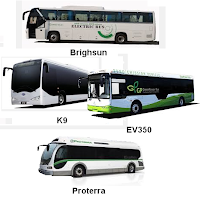A new generation of fully electric buses is on the way making low carbon transport a reality. If we are to keep temperatures from rising more than 2C above preindustrial times we must find efficient, emissions-free solutions to mass transportation. The new generation of electric buses are a critical piece of the zero emissions puzzle. Electric buses will also reduce the air pollution that is plaguing urban environments.
Electric buses are not new, the Chinese automaker BYD introduced an electric bus in 2010. It is called the K9 and it is powered with an Iron-phosphate battery, that has a range of 155 miles or 250 kilometers on one single charge. Newer e-buses have quadrupled that range.
However a new generation of electric buses have much better ranges and are capable of traveling an entire day without recharging. In 2015 an Australian all-electric bus broke a record by driving 1,018km on a single charge. The bus was built by Brighsun in Melbourne and employs a high performance lithium ion battery with proprietary eMotor, battery management and a regenerative braking system.
As reported by One Step Off the Grid, Brighsun communications director, Gladys Liu, said:
"We believe it will bring a whole new concept of public transport with no pollution to Australia and to the world."
The company is planning on opening manufacturing facilities across Australia.
Another electric bus called the EV350 is GreenPower’s flagship product. This bus has the latest electric drive, battery technologies, and battery management system combined with a lightweight chassis and low floor body. The EV350 has a range of 185 miles or 300 kilometers. Another GreenPower product the 550 has an even better range of 240 miles or 385 kilometers.
The Proterra is an electric bus that has recently been analyzed by the National Renewable Energy Laboratory (NREL). It received high marks and as reviewed in EV Obsession, a recent analysis of the Proterra e-bus, "possess an average fuel economy roughly 4 times higher than that of baseline CNG [compressed natural gas] buses."
According to the NREL analysis, the Proterra is also highly reliable. This Proterra is touted as being "exceptional for an advanced technology bus in the early stage of commercialization."
However, the Green Car Congress reports that the average runtime per day is 13.2 hours with an average of 13 charges per day. Each charge averages 20 kWh energy delivered.
Here is an excerpt from the analysis:
"One major challenge is addressing demand charges and time of use charges that affect electricity cost. This will be a major challenge for any fleet looking to deploy electric buses that charge during peak times."
- Blogger Comment
- Facebook Comment
Subscribe to:
Post Comments
(
Atom
)

0 comments:
Post a Comment